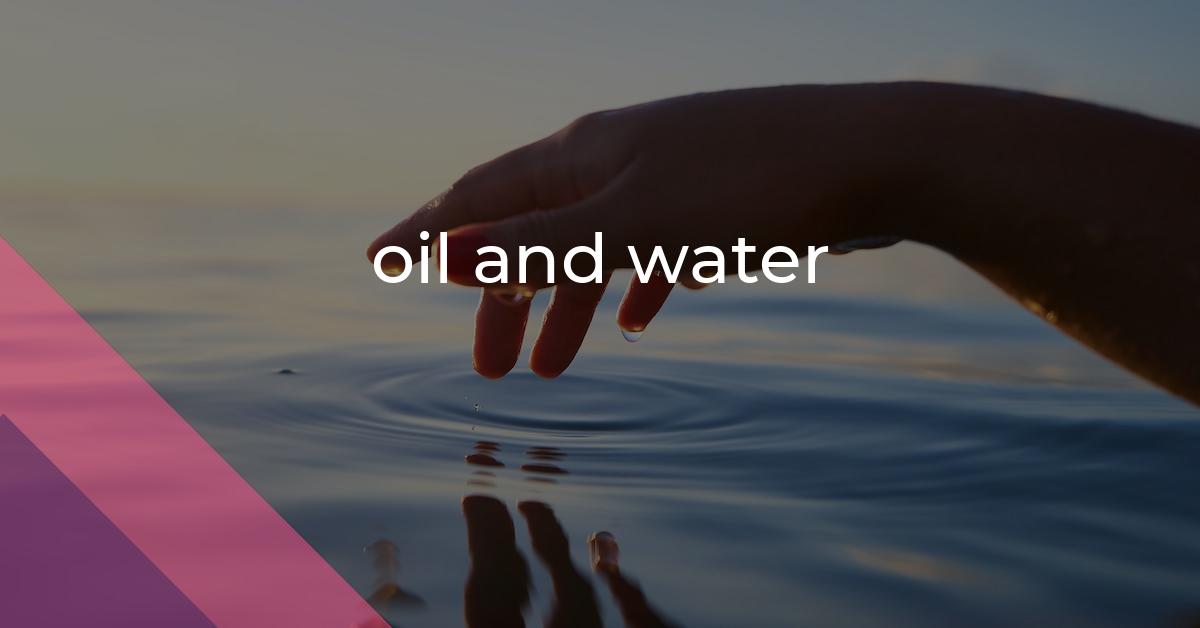oil and water: Idiom Meaning and Origin
What does ‘oil and water’ mean?
The idiom "oil and water" describes two things or people that do not mix well or cannot coexist harmoniously due to fundamental differences or incompatible qualities.

Idiom Explorer
The idiom "summer and winter" refers to the two extreme seasons that represent opposite conditions or moods. It is often used metaphorically to describe a stark contrast or a wide range of differences between two things or situations.
The idiom "same difference" is used to express the idea that two things may seem different but are actually quite similar or have no significant difference.
The idiom "salad" refers to a mixture or combination of various things or elements that do not seem to go well together. It implies a lack of harmony or coherence in a particular situation or context.
An idiom often used to describe a person who is disliked or considered bad, with negative qualities or behavior.
The idiom "pour oil on troubled waters" means to do or say something to calm a difficult or tense situation.
The idiom "poles apart" means two things or people being extremely different or having opposite opinions or beliefs.
The idiom "parting of the ways" refers to a situation where two or more people or groups are going in different directions or have different opinions, leading to a separation or disagreement.
The idiom "oil trash" is not widely known and does not have a clear, universally accepted meaning. It might refer to waste materials generated from the oil industry, or it could be used metaphorically to describe someone or something of low value or quality.
The idiom "of the same stripe" means that two or more people or things are similar or have similar qualities, usually in a negative or undesirable way.
The idiom "no love lost" means that there is a strong dislike or animosity between two people or groups.
Unlikely Mixture
The idiom "oil and water" is a commonly used phrase in American English that metaphorically describes two entities or individuals that do not mix well together. This phrase draws its meaning from the fundamental characteristic of oil and water being immiscible substances, unable to blend or form a homogeneous mixture. The origins of this idiom can be traced back to the early 17th century, and it has since been ingrained in the English language as a metaphor for irreconcilable differences between two parties.
The idiom "oil and water" is often used to describe situations where two people or groups have fundamental differences in attitudes, beliefs, or values, making it difficult for them to coexist harmoniously. Just as oil and water will naturally separate when mixed, these individuals or groups are unable to find common ground or establish a cooperative relationship. The idiom is frequently employed to convey the notion that despite efforts to bring these opposing forces together, they inevitably remain distinct and incompatible.
This idiom, with its simple and evocative imagery, has found its way into numerous contexts and situations in American society. It is frequently used in discussions about relationships, such as marriages or partnerships, to portray the struggles faced when two individuals with contrasting personalities or interests try to maintain a cohesive bond. Likewise, in the business world, the idiom is often employed to describe conflicts among colleagues or differences between work styles that inhibit cooperation and collaboration.
The idiom "oil and water" is not limited solely to interpersonal relationships, but it is also used to describe contrasting elements in various areas of life. In the realm of politics, it may refer to the difficulty of finding common ground between political ideologies or parties. Similarly, in art and literature, the idiom can be employed to depict a lack of compatibility between different artistic mediums or styles that do not blend harmoniously.
When it comes to relationships, the idiom "oil and water" couldn't be more different than a harmonious mix. It's like trying to mix apples and oranges together—they simply don't blend. Just as a dog and cat have their own characteristics and behaviors that make it difficult for them to coexist peacefully, individuals or groups described by this idiom experience the same challenges. They are neither fish nor fowl, unable to find a balance or compromise that allows for a cohesive relationship. It's like trying to create a salad with oil and water—they just won't mix.
Despite its frequent use and wide recognition, the idiom "oil and water" does not possess any variants or alternate forms. Its metaphorical meaning remains consistent across different contexts and does not diverge significantly from its literal representation. The simplicity and universality of the idiom contribute to its enduring popularity and continued use in contemporary American English.
The idiom "oil and water" serves as an effective metaphor for expressing irreconcilable differences between two parties. Through its association with the immiscibility of oil and water, this idiom captures the inability of certain individuals or groups to blend harmoniously. Its widespread usage in American English reflects its relevance in various aspects of life, ranging from personal relationships to politics and the arts. The phrase contributes to the richness and expressiveness of the English language, encapsulating the complexities of human interactions. While it may seem conclusive, this analysis merely scratches the surface of the idiomatic landscape, inviting further exploration and uncovering of deeper meanings in the vast realm of idioms.
Example usage
Examples of how the idiom "oil and water" can be used in a sentence:
- Like oil and water, they just don't mix well together.
- Their personalities clash because they are like oil and water.
- They have different interests and are as incompatible as oil and water.
More "Incompatibility" idioms
We missed the mark - nothing found.



